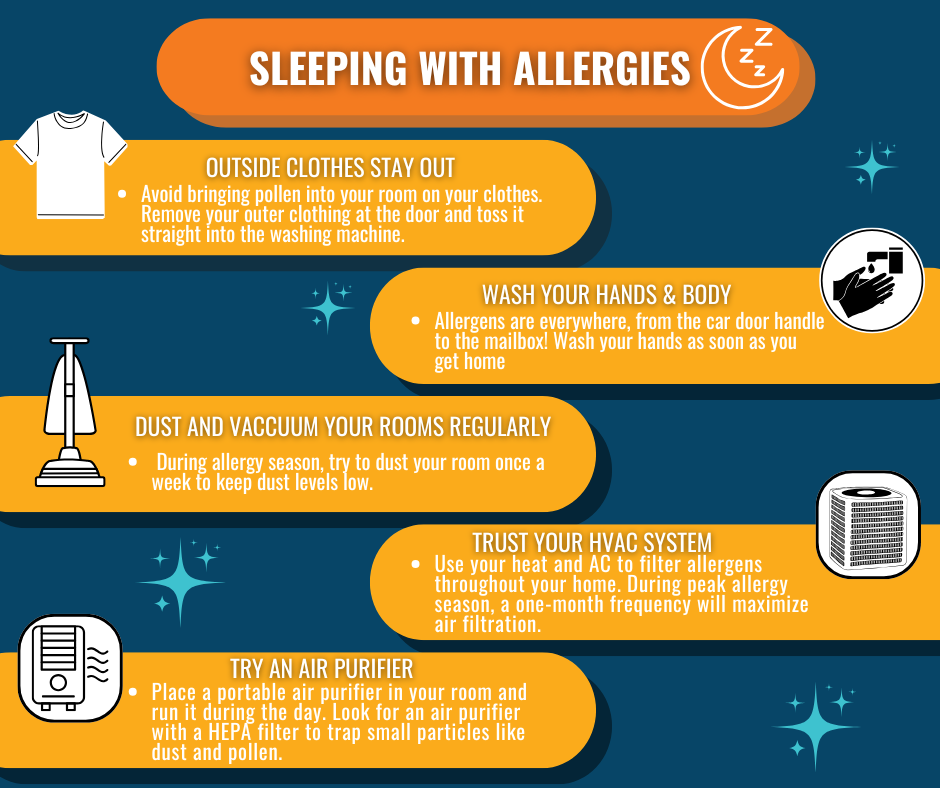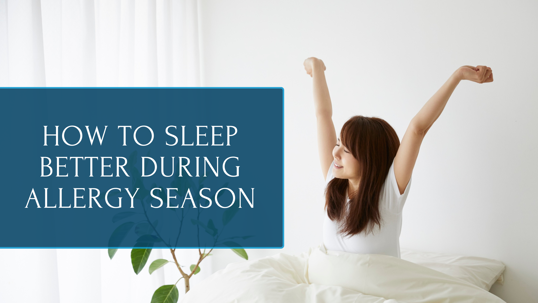It’s tough to keep seasonal allergens in check to get a good night’s sleep. Fortunately, there are ways to keep pollen and other irritants at bay! With regular cleaning and dusting, plus a well-maintained HVAC system, you can sleep better with allergies without living in a bubble! Learn more about sleeping with allergies in the Clearwater area with helpful tips from FAST of Florida.
Common Causes of Bedroom Allergies
Seasonal allergy sufferers dread the spring bloom, summer’s hay fever, and fall mold. Roughly a quarter of US adults have seasonal allergies, including tree and grass pollen, ragweed, and mold spores. Try as you might to keep them out; pollen and mold spores can still get into your home. Their presence, in combination with indoor irritants like dust, pet dander, and mold, can severely impact your sleep.
Read more: How to Improve Indoor Air Quality Affordably

How to Sleep Better with Allergies
If your allergies prevent you from sleeping well, try these tips to get some shut-eye.
1. Dust and Vacuum Your Bedroom (at Least) Once Per Week
Between sleeping, relaxing, and getting ready for the day, our bedrooms quickly collect indoor and outdoor allergens. Because they are typically closed off from the rest of the house, they tend to suffer from poor air circulation. Promoting air circulation by running the HVAC system and keeping the door open, in combination with regular cleaning, can help prevent a build-up of dust, dander, and particulates in your room.
2. Run Your HVAC System
Running your HVAC system will help prevent it from becoming impacted with dirt and debris and can help filter particulates from the air circulating in your home.
Just be sure to replace your HVAC’s air filter every 1-3 months at minimum. During peak allergy season, a one-month frequency will maximize air filtration.
Check your owner’s manual or contact FAST of Florida to see if a HEPA filter is compatible with your system.
3. Remove Outdoor Clothes at the Door
To avoid bringing pollen into your room on your clothes, remove your outer clothing right at the door and toss it straight into the washing machine.
4. Wash Your Hands (A Lot)
Allergens like pollen settle on and stick to surfaces. Everything from your car door handle to your mailbox is potentially covered in allergens. Wash your hands frequently and avoid touching your face to avoid exacerbating your allergy symptoms.
5. Run an Air Purifier
Place a portable air purifier in your room and run it during the day. Look for an air purifier with a HEPA filter to trap small particles like dust and pollen.
Does Sleeping with a Humidifier Help Allergies?
Sleeping with a humidifier may alleviate symptoms for some individuals, but it’s far from a universal solution. High humidity levels may worsen allergies, especially for people sensitive to mold and dust.
Allergies and Sleep: Why It’s So Hard to Get Shut-Eye
You might notice your symptoms are worse when you sleep. Allergies tend to be more severe at night due to the increased exposure to indoor allergens and lack of ventilation, plus your body’selevated histamine levels. For some individuals, simply lying down can exacerbate symptoms due to airway anatomy.
What Is the Best Temperature and Humidity for Sleeping?
The EPA recommends keeping your home between 60 and 67 degrees Fahrenheit and capping humidity at 30% to 50%. An optimal humidity level and temperature will help promote good sleep.
Trust Clearwater’s HVAC Pros
Fast of Florida is the reliable source for all your home service needs in the Clearwater, FL, area. Learn how our technicians can help you sleep better this allergy season. We’re committed to keeping our neighbors comfortable day and night all year.
Contact us online or call 727-273-7810 to get started today!

